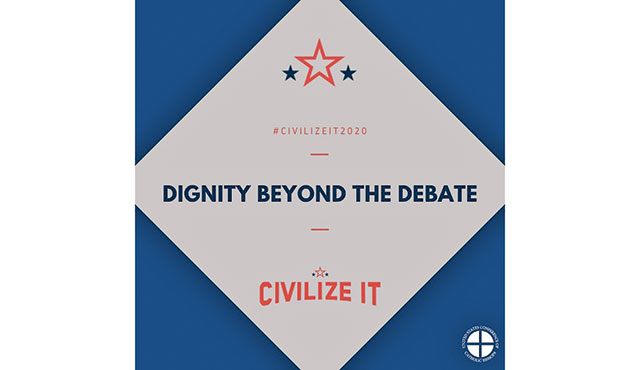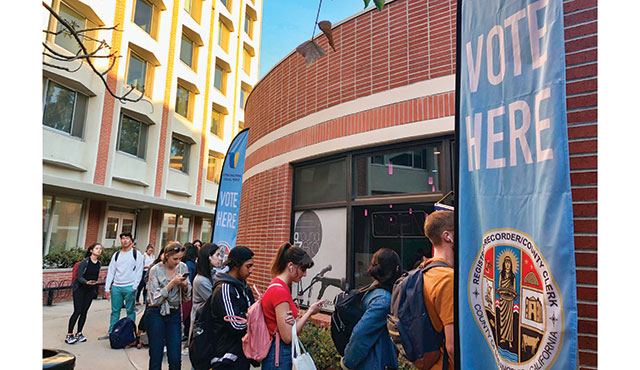As Americans continue to work their way through some of the most polarizing times in memory, politics, morality and faith will weigh heavily in the November 2020 election. From the presidential and congressional elections, where candidates offer widely divergent views of the country and its future, to state propositions, some of which will have profound effects on our lives and beliefs, this election will require voters of faith to reflect, and pray.
Many experts across the spectrum say this election may be as critical as any in the modern age. By itself an election cannot bridge all the social, political and religious divides that separate citizens and communities. However, it remains the collective promise of democracy that makes the notion that “there is more that unites us than divides us,” more than just a political bromide.
The California Catholic Conference, which represents the state’s 10 dioceses and two archdioceses and their bishops and archbishops, encourages parishioners to practice “faithful citizenship” and follow Pope Francis’ call “to participate for the common good.”
The Pope said, “Sometimes we hear: a good Catholic is not interested in politics. This is not true: good Catholics immerse themselves in politics by offering the best of themselves so that the leader can govern.”
The goal of the California group is to “empower Catholics to put their faith into action consistent with Catholic teaching.”
In “Catholics Care. Catholics Vote,” the U.S. Conference of Catholic Bishops writes, “The dual calling of faith and citizenship lies at the heart of what it means to be a Catholic in the United States. We stand on the shoulders of many Catholics who have gone before us, who have helped the United States of America become a better country because of their faith in a loving God. “
The 70 million Catholics in the United States and more than 1.3 million in Orange County will be a huge factor in the coming election. To help local parishioners work through and reflect on the issues, the California Catholic Conference has created an elections page as well as analyses of state propositions to explain the positions of the Church.
Although the Church does not engage in partisan politics, such as endorsing candidates, it does have official positions on public policy matters, which can come up in propositions.
In the upcoming election, California has 12 certified propositions.
On most of those measures, which cover issues from taxes to voting rights to funding initiatives, the conference does not take a position.
However, the conference has taken strong stances against two: Proposition 14, which would increase funding for stem cell research; and Proposition 20, which toughens laws on parole and property crimes and expands DNA collection.
Here are synopses of the propositions and the Church response.
PROP 14
Issues $5.5 billion in bonds for the state’s stem cell research program, the California Institute for Regenerative Medicine. The program was approved by voters in 2004 through Proposition 71 with $3 billion, nearly all of which is depleted. The proposition seeks the added money to fund stem cell projects, including research on embryonic stem cells. It also makes structural changes and mandates improved patient access to stem cell treatments.
RESPONSE
The California Catholic Conference strongly recommends a NO vote based on moral and ethical objections to using human embryonic stem cells as the raw material for experimentation and inadequate financial accountability and oversight of taxpayer funds.
According to the Church’s Donum Vitae: Instruction on Respect for Human Life from the Congregation for the Doctrine of the Faith, no objective no matter how seemingly noble, “can in any way justify experimentation on living human embryos or fetuses, whether viable or not, either inside or outside the mother’s womb.”
In 2004, Catholic bishops opposed the original proposition, saying although they supported research from adult and umbilical cord stem cells, “Proposition 71 involves the technology of human embryonic cloning, cannot be justified from an ethical perspective, promises what may not happen, and is a financial boondoggle.”
PROP 20
The Criminal Sentencing, Parole and DNA Collection Initiative, repeals voter-approved Propositions 47 and 57, from 2014 and 2016, respectively, and adds crimes to the list of violent felonies for which early parole is restricted. It also recategorizes and makes more serious certain types of theft and requires DNA collection for a number of misdemeanors.
RESPONSE
The California Catholic Conference strongly recommends a NO vote. It says recent reforms have succeeded in reallocating resources toward rehabilitation and reduced prison overcrowding and population by more than 40,000. The conference says Prop 20 attempts to overturn that progress and restore a punitive rather than restorative justice system in California.
“A Catholic approach leads us to encourage models of restorative justice that seek to address crime in terms of the harm done to victims and communities, not simply as a violation of law,” according to the U.S. Bishops.
Wherever prayer and reflection lead the Catholic voter, leaders say it is vital to be part of the process.
“In the Catholic tradition, responsible citizenship is a virtue; participation in the political process is a moral obligation,” according to Catholic Bishops.
To learn more about voting resources on how, where and when to vote, visit ocvote.com


